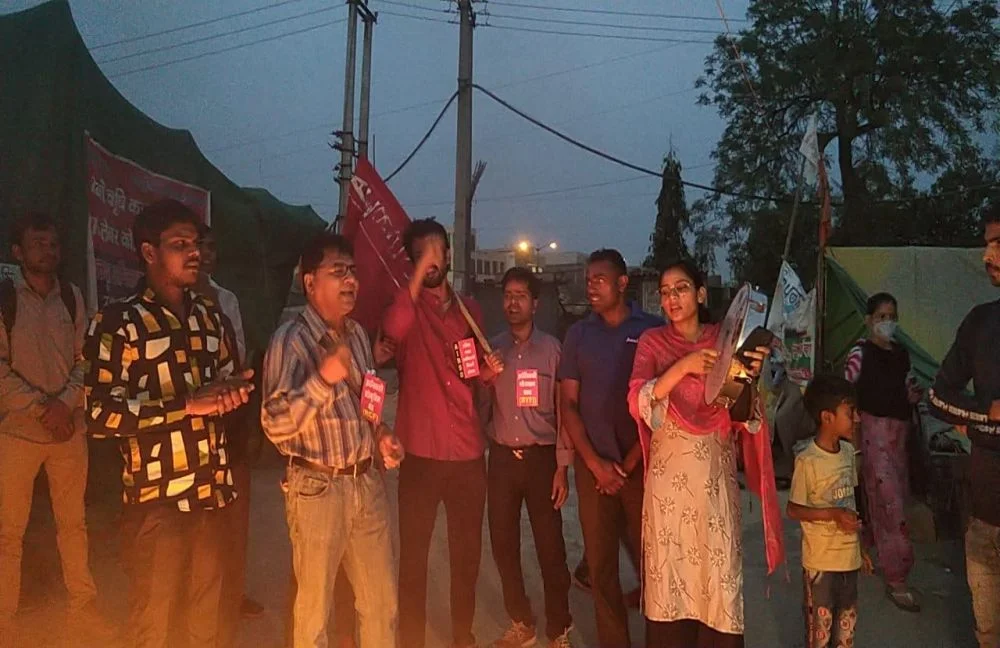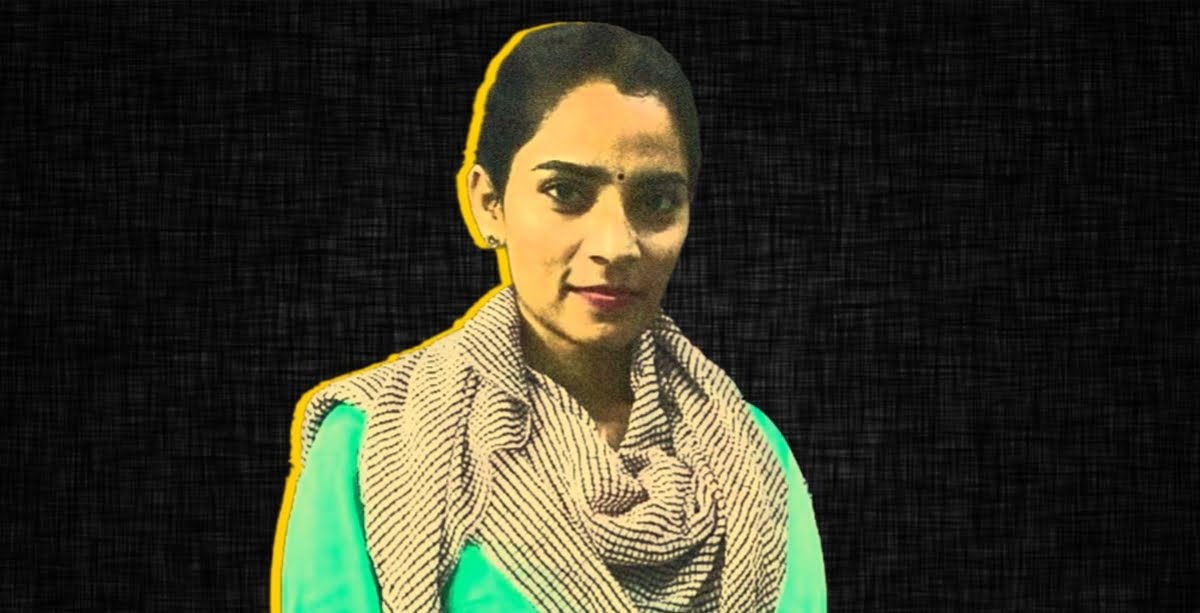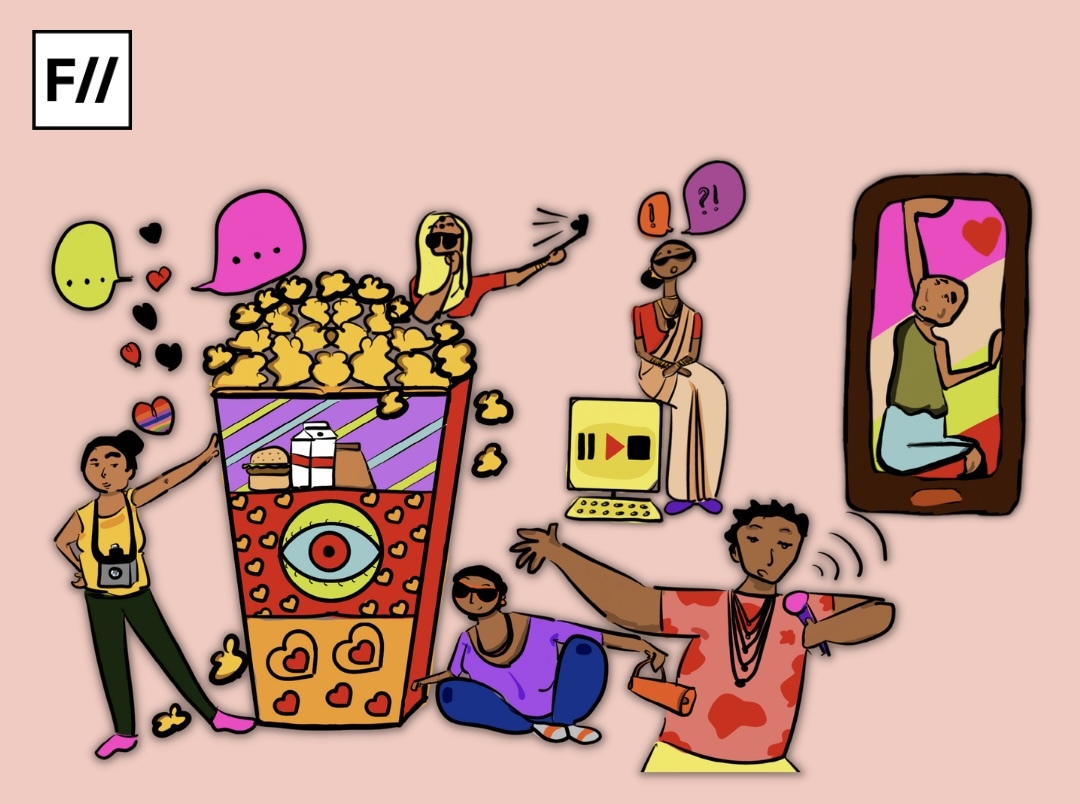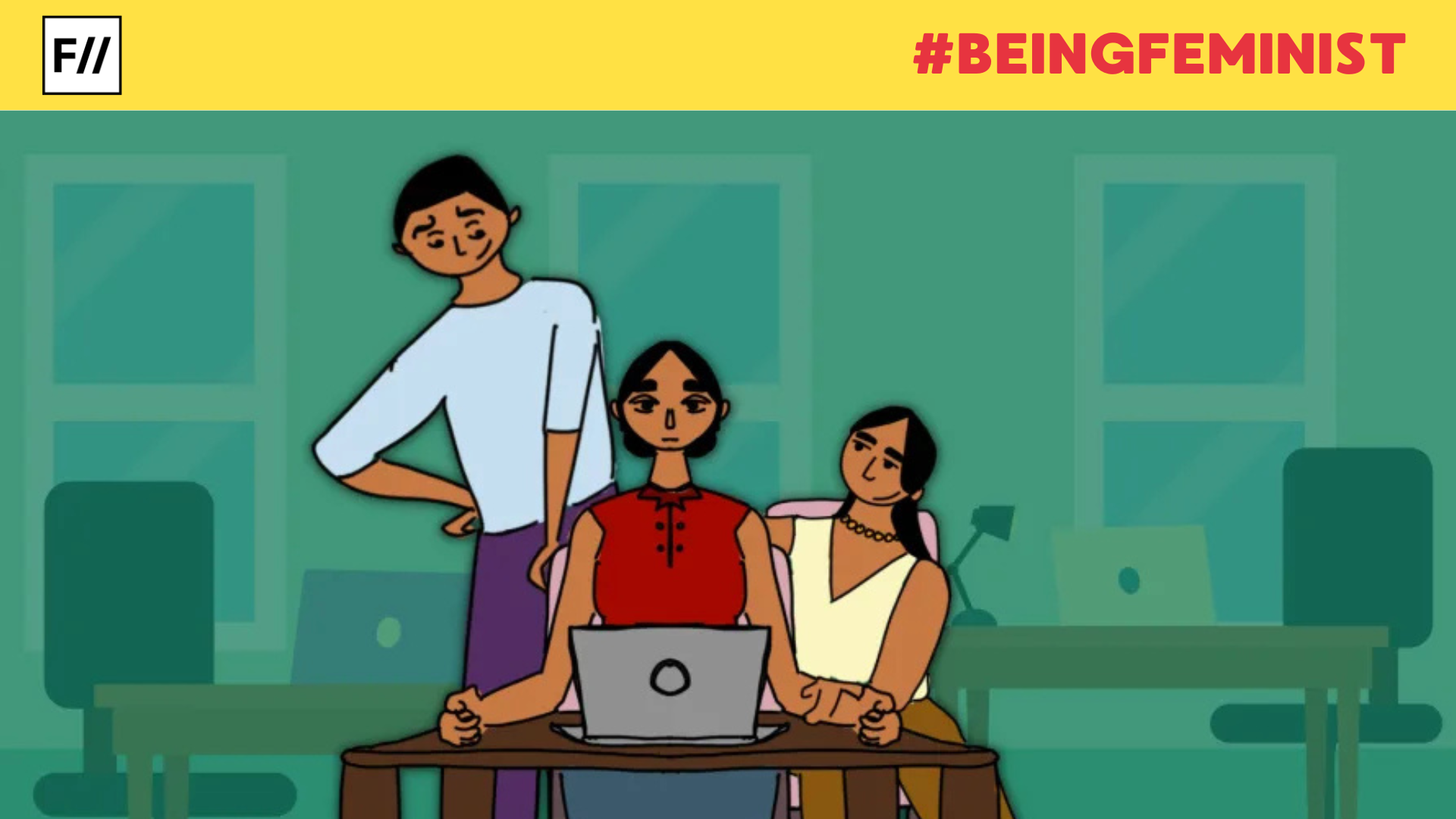Posted by Nodeep Kaur
My name is Nodeep Kaur and I am a labour rights activist. I am 23 years old and I come from a Dalit family of activists in rural Punjab. While my mother and sisters are members of different unions that work with Dalit landless agricultural labourers, students, and workers, I am a member of the Mazdoor Adhikar Sangathan that fights for workers’ rights in the Kundli Industrial Area in Sonipat, Haryana.
I have been an activist for as long as I can remember. I understood, very early on, the class and caste inequalities in our society. After reading books written on and by philosophers and political theorists such as Karl Heinrich Marx and Vladimir Ilyich Ulyanov (better known as Lenin), my resolve to fight the injustice meted out to the so-called lower caste and the working class grew stronger. I have been taking part in protests and demonstrations along with my sisters and mother since my school days.
My family was forced to leave Lakhewali—a village in Sri Muktsar Sabhib district, Punjab—because my mother, who was an agricultural labourer, was trying to unionise other labourers to ensure that their rights to fair payment and better working conditions were not compromised.
Being aware of our rights and having the will to fight to protect them often landed my family and me in trouble. My family was forced to leave Lakhewali—a village in Sri Muktsar Sabhib district, Punjab—because my mother, who was an agricultural labourer, was trying to unionise other labourers to ensure that their rights to fair payment and better working conditions were not compromised. Agitated by her actions, the zamindars (landlords) made sure that my family was boycotted and no one gave us work in their fields. That’s when my education was interrupted.
Also read: Silencing Dissent: Nodeep Kaur’s Unjust Arrest
Before being arrested by the Sonipat Police on January 12th, 2021 on false charges of attempt to murder, rioting, and assault, I was working at FIEM Industries Limited at Kundli. I used to manufacture 2,000 motorcycle indicators in a day at the factory and was being paid INR 7,500 to 8,000 per month for 10 hours of work. I was fired from the job after my arrest. During weekdays, I used to work at the factory, and on weekends, I would organise and hold meetings with workers, especially migrant workers, to spread awareness about their rights and listen to their grievances. But ever since the farmers’ protest broke out, I had been paying regular visits to the Singhu border to show my solidarity with the cause of the farmers.
During my time in jail, I received a lot of support from people across the world and I was eventually released on bail in February 2021. This support has been very encouraging not just for me, but also for my colleagues from the union; now everyone knows what we stand for and what our fight is all about. But this recognition has come with its own set of challenges. Since my release, I have been looking for jobs in the industrial area, but no company is willing to hire me or my fellow union members as they fear retaliation from us in case of exploitation.
So, now I have decided to dedicate my entire time to activism. I have been living in a makeshift tent with union members and workers at the farmers’ protest site at Delhi’s Singhu border.
5.00 AM: I wake up early on Sundays because all the workers are at home and I have to accompany the other union members on a door-to-door outreach and labour rights awareness drive. We mostly operate in labour colonies at Kundli such as Prem colony, Pyau, Bahalgarh, and Rai among others.
On other days, I get up at 5.30 AM because I have to reach the Kundli’s traffic junction where all the labourers working in various factories in the area gather at 6 AM to be picked up by contractors and employers. We talk to them and distribute pamphlets with information on labour rights and our contact details.
6.00 AM: We reach Prem colony and each union member is assigned a lane within the colony. Sometimes we assign different colonies to different members. During our visit to the workers’ homes, we interact with them and their family members, ask them if they are facing any issues at their place of work, how much they are being paid for how many hours of work, if they are allowed to take short breaks during their shift, and so on. We also invite them to a movie screening at our tent at 7 PM in the evening.
These workers and their families welcome us with open arms and offer us tea and snacks, sometimes even breakfast.
7.30 AM: One labourer, who is working at a glass factory at Kundli, tells me that the factory owner has not paid him and 149 of his colleagues their salaries for two months. I usually gather all the relevant documents that prove a labourer’s employment at the said company, their salary, and so on. This is just to make sure that I have all the proof before approaching the factory owner or manager. I tell him to gather the other workers whose payments are due and meet me with their documents at the junction in their colony as soon as possible.
11.00 AM: Once the other workers have gathered, I hear them out and take a look at the documents they have brought with them to prove their allegations against the company. After going through their papers, I realise that their case is genuine and they need help.
1.30 PM: The union members coordinate with each other over our WhatsApp group and once each one of us is done visiting each home in the colony, we meet up and discuss what we learnt or encountered during our visit.
I tell them about the 150 workers who have been denied their salaries by their employer. Others have similar stories to tell, from labourers being laid off without severance or notice to being made to work overtime without compensation, and so on. We then start planning our strategy to address these issues.
3.00 PM: To avoid wasting any time, we decide that all the union members will visit different factories on Monday. This means that while I will represent the labourers I spoke to and visit their company to secure their payment, the others will visit other factories.
I call up the labourer and tell him to inform the others to reach the factory at 9 AM the next day.
Also read: Dig Into The History Of The Casteist System You’ll Find Many Nodeeps
It is always difficult to confront the factory owners with demands for payment of pending wages because they are always hostile towards us. From denying that the labourer or labourers in question are or were their employees to calling goons and police to tackle and disperse us, the companies resort to all kinds of tactics. But we have gotten used to this and are always prepared to face all kinds of situations. We always begin by approaching them for a talk. If they don’t comply, we stage a sit-in demonstration right outside their factories and refuse to budge until and unless our demands are met.

In December last year, I was approached by a labourer who wasn’t paid his one month’s salary—INR 6,500—before being sacked from Saraswati Steel at Kundli. The next day, I led a team of 20-25 workers, some from the same company and some ex-employees. As we reached the factory and tried to enter the premises, the security guards closed the gates. But we kept shouting and raising slogans demanding that the pending wages be paid. After a few minutes, the factory owner, accompanied by some local goons, came outside to talk to us. He denied owing wages to any worker and refused to accept the labourer in question as his employee. He accused us of planting him to extort money from them and ordered his goons to get rid of us.
We were pushed, shoved, and called names but we stayed put. The intimidation did scare some of the workers accompanying me. Hearing the commotion, many farmers who were protesting against the three farm laws at the nearby Singhu border joined us, but some also raised objections and accused us of trying to malign the farmers’ protest. The factory owners also called in the police, who used force to deter us. We fought back and my clothes also got torn in the brawl as the police kept pulling me to take me to the police station. But we refused to leave the site. In the evening, the company paid INR 6,500 to the worker and we called off the protest. On our way back, we celebrated by raising victory slogans and singing revolutionary songs as this was a big and important moment for us. It was not just about the money, but also about showing the workers that we are there with them and that they need to fight for their rights because if they don’t ask for them, they won’t get them.
4.30 PM: We take a break and go back to the tent.
5.00 PM: After reaching the tent, we freshen up and eat at the langar (community kitchen) being run at the Singhu border. While some of us choose to take a nap, some of us read books or articles.
6.30 PM: We start making preparations for the movie screening. We always play non-fiction movies that are thought-provoking and help the viewers learn something about issues such as the class struggle across the world. We have rented a projector and a screen to showcase the movie.
7.00 PM: The labourers start coming in, some with their families and some without. We arrange some tea and snacks for them. By 7.30 PM, we start the movie. Several farmers also join us.
Some days, instead of a movie screening, we invite the labourers to a meeting by announcing it on a loudspeaker in their colonies. We discuss issues such as the farmers’ protest, the three farm laws, labour codes, minimum wage, and so on.
8.30 PM: The movie gets over and the workers start to leave. We also pack up the projector and screen to make space for our mattresses.
9.00 PM: I go to a nearby friend’s rented accommodation to bathe and wash my hair before having dinner. It’s a good thing that we get free shampoo sachets at the farmers’ protest. There were times when I didn’t have the money to buy a sachet of shampoo costing INR 1. People think we do this for money and take a cut from the labourers to secure their pay from the factory owners during negotiations. But that is not true.
We don’t earn anything for our services and we are always living under the threat of being attacked by goons hired by the companies.
9.30 PM: I come back, have dinner, and go to our tent to sleep.
I always wanted to study and complete my education, but my family’s poor financial condition did not allow me to do so. I somehow managed to complete my higher secondary (Grade 12) through correspondence with the money I earned while working at the factories. I also applied to Shri Guru Tegh Bahadur Khalsa College in Delhi and I got in too, but couldn’t pursue my admission because I couldn’t afford to pay the fees.
These experiences made me realise how the existing caste and class system is designed to prevent the oppressed and the underprivileged from breaking free from this unfair system. Any attempt to break free from or challenge the system is crushed to set an example by those at the helm of both structures.
These experiences made me realise how the existing caste and class system is designed to prevent the oppressed and the underprivileged from breaking free from this unfair system. Any attempt to break free from or challenge the system is crushed to set an example by those at the helm of both structures. I want to create a system where a labourer’s child does not have to become a labourer.
After my arrest, I feel even more determined to fight for labour rights. Earlier, our work was limited to a small area in Sonipat, but now we get calls from several places, from workers who invite us to their homes and seek suggestions on how to form a union.
As told to IDR.
This piece was previously published on India Development Review and has been re-published here with consent.
About the author(s)
India Development Review (IDR) is India's first independent online media and knowledge platform for the development community.




